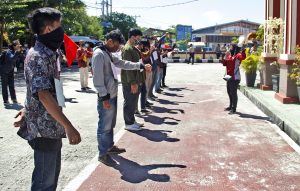An Indonesian court on Wednesday sentenced seven Papuan pro-independence activists to nearly yearlong jail terms on treason charges for organizing anti-racism protests last year, despite calls from rights groups and politicians to drop the charges and release them.
Judges in the Balikpapan District Court in East Kalimantan province read out the verdicts in seven separate trials that were held remotely due to the coronavirus pandemic.
The judges ordered the period of detention that the men had already served to be deducted from their sentences, meaning they will walk free within several weeks.
The judges said the seven were guilty of treason because they had demanded in speeches during the protests that the government hold a referendum on independence for Papua.
Papua is a former Dutch colony in the western part of New Guinea that is ethnically and culturally distinct from much of Indonesia. It was incorporated into Indonesia in 1969 after a U.N.-sponsored ballot that was seen as a sham by many.
Since then, a low-level insurgency has continued in the mineral-rich region, which is divided into two provinces, Papua and West Papua.
In recent years, Papua students, including some who study in other provinces, have become vocal in calling for self-determination for the region.
The case has highlighted Indonesia’s sensitivity about the Papua region, where the indigenous Papuans oppose Indonesian rule.
Dozens of rights activists staged a rally in front of the court on Wednesday, demanding that the seven men be released.
“The charges against them are baseless,” said Amnesty International Indonesia’s executive director, Usman Hamid. “It directly contradicts earlier pledges from President Joko Widodo about protecting the right to freedom of expression.”
Prosecutors previously were seeking prison terms of 5 to 17 years for each of the defendants, a demand slammed by international rights groups. Indonesian social media users have adopted the hashtag #PapuanLivesMatter.
“Indonesia had its own version of Black Lives Matter protests last year, and police outrageously charged and detained those seen as organizing the protests,” Human Rights Watch’s Asia director, Brad Adams, said in a statement ahead of the verdicts.
“Indonesian authorities should recognize that given the global attention to the Black Lives Matter movement, sending peaceful activists to prison will only bring more international attention to human rights concerns in Papua,” Adams said.
Nearly 200 Papuan politicians, religious leaders, and members of parliament have signed a petition asking Widodo to drop the charges against the men.
Buchtar Tabuni, a leader of the pro-Papuan independence group United Liberation Movement for West Papua, was sentenced to 11 months in jail. He had also been convicted for treason in 2008 and was jailed then for three years after helping organize a peaceful independence gathering.
Two other activists, Agus Kossay and Stevanus Itlay from the National Committee of West Papua, were also sentenced to 11 months, while Alexander Gobay, Ferry Gombo, Irwanus Uropmabin and Hengky Hilapok, who were student leaders at several universities in Papua province, were sentenced to 10 months in jail.
The men were arrested last September in Jayapura, the capital of Papua province, days after participating in a rally as part of weeks of protests triggered by videos that circulated widely on the internet showing police, backed by soldiers, calling Papuan students “monkeys” and “dogs.”
Protests in several cities in Papua and West Papua provinces turned violent, leaving more than 30 people dead and hundreds of buildings and vehicles burned.
Indonesian authorities transferred the seven men more than 3,000 kilometers (1,800 miles) away to be tried in Balikpapan on Borneo island in October for “security reasons.” The defendants denied any wrongdoing.
In April, the Central Jakarta District Court sentenced Paulus Suryanta Ginting, an Indonesian rights activist, and five Papuan pro-independence students to nine months in jail for treason after they attended a peaceful anti-racism protest last August in Jakarta, Indonesia’s capital, calling for independence for the restive region.
By Niniek Karmini for the Associated Press

































